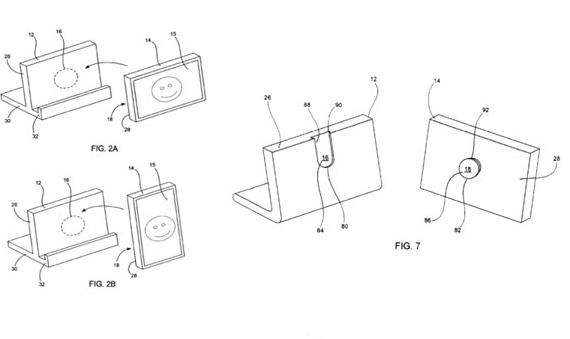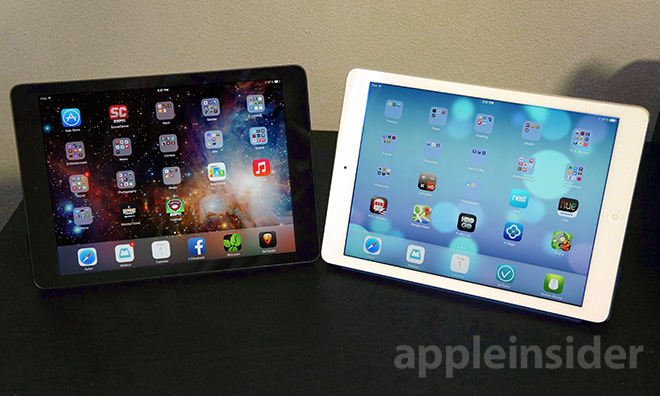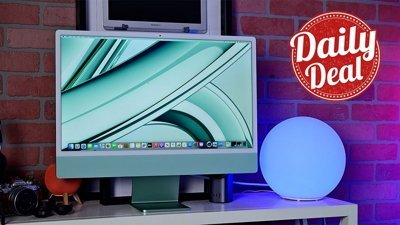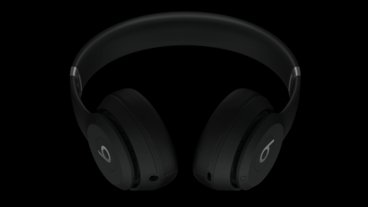J.P. Morgan predicts new, separate & converged 'iAnywhere' computing platform in Apple's future
With smartphone growth slowing, investment firm J.P. Morgan predicts that Apple's "next big thing" could be a new, converged operating system that could allow an iPhone or iPad to dock into a specifically configured display and run as a more traditional computer.
An Apple tablet docking station concept discovered by AppleInsider in 2008.
The global tech research team at J.P. Morgan believes that a so-called "iAnywhere" operating system from Apple would be something of a converged Mac OS and iOS, but would still keep the two platforms distinct. The details were shared with AppleInsider in a note to investors on Wednesday.
While Apple has publicly panned converged devices, J.P. Morgan believes Apple could grow iOS and boost revenue by selling accessories that would offer a more traditional and powerful computing experience.
They don't see Apple's traditional OS X platform being replaced, but instead see iOS growing in functionality and existing alongside the separate, dedicated Mac operating system. This new platform could potentially run Mac applications when connected to a larger display.
"In our view, iAnywhere could be a stepping stone to a broader peripherals and services-led sales, partially reducing Apple's dependence on device-led product cycles," Moskowitz wrote. "Apple could generate revenue through the sale of specifically configured displays, iAnywhere-capable iPhones or iPads, and cloud-based software and storage services."
Rod Hall of J.P. Morgan believes that "iAnywhere" could be a key trend for Apple as soon as this year, with a new product that could serve as an alternative to the company's pricier MacBook lineup. Such a device could reignite growth among Apple's iOS devices and drive further market share gains, Hall wrote in a separate research note.
Apple executives have said clearly on a number of occasions that they intend to keep their iOS and OS X platforms separate. Chief Executive Tim Cook quipped in 2012 that "anything" can be converged, but as Microsoft's Windows 8 platform has shown, the results may not be advantageous.
"You can converge a toaster and a refrigerator, but you know, those things are probably not going to be pleasing to the user," Cook said.
However, in its own patent filings, Apple has shown some interest in experimenting with versatile docking stations that could turn portable devices into more traditional desktop computers. One such patent uncovered by AppleInsider back in 2008 showed an iMac-like stand that could house and be powered by a portable MacBook.
J.P. Morgan sees the patents Apple owns, as well as the company's switch to a desktop-class 64-bit processor in its latest iPhone and iPad models as moves that have set the stage for a more full-featured computing experience on iOS. Specifically, they believe Apple's 64-bit processors provide enough horsepower to run applications and drivers related to the Mac OS.
The new, so-called "iAnywhere" category could be introduced by Apple in the next 12 to 18 months, J.P. Morgan's research team has predicted. They see the platform potentially being introduced alongside a new iPad with a larger display and a dedicated keyboard — Â joining other predictions of an upcoming "iPad Pro" that would exist beyond the current high-end iPad Air.
Moskowitz said he believes an "iAnywhere" platform could offset any cannibalization risks to Apple's Mac platform by selling a number of peripherals, accessories and services in addition to iPhones and iPads.
"Moreover, we think it is important to point out that the iAnywhere revenue content per user could be similar or larger in size than a traditional Mac (computer) purchase given the mobility and peripherals revenue streams as well as the recurring nature of revenue related to the cloud-based services," he said.
 Neil Hughes
Neil Hughes












 Christine McKee
Christine McKee
 William Gallagher
William Gallagher
 Andrew Orr
Andrew Orr
 Sponsored Content
Sponsored Content
 Malcolm Owen
Malcolm Owen








